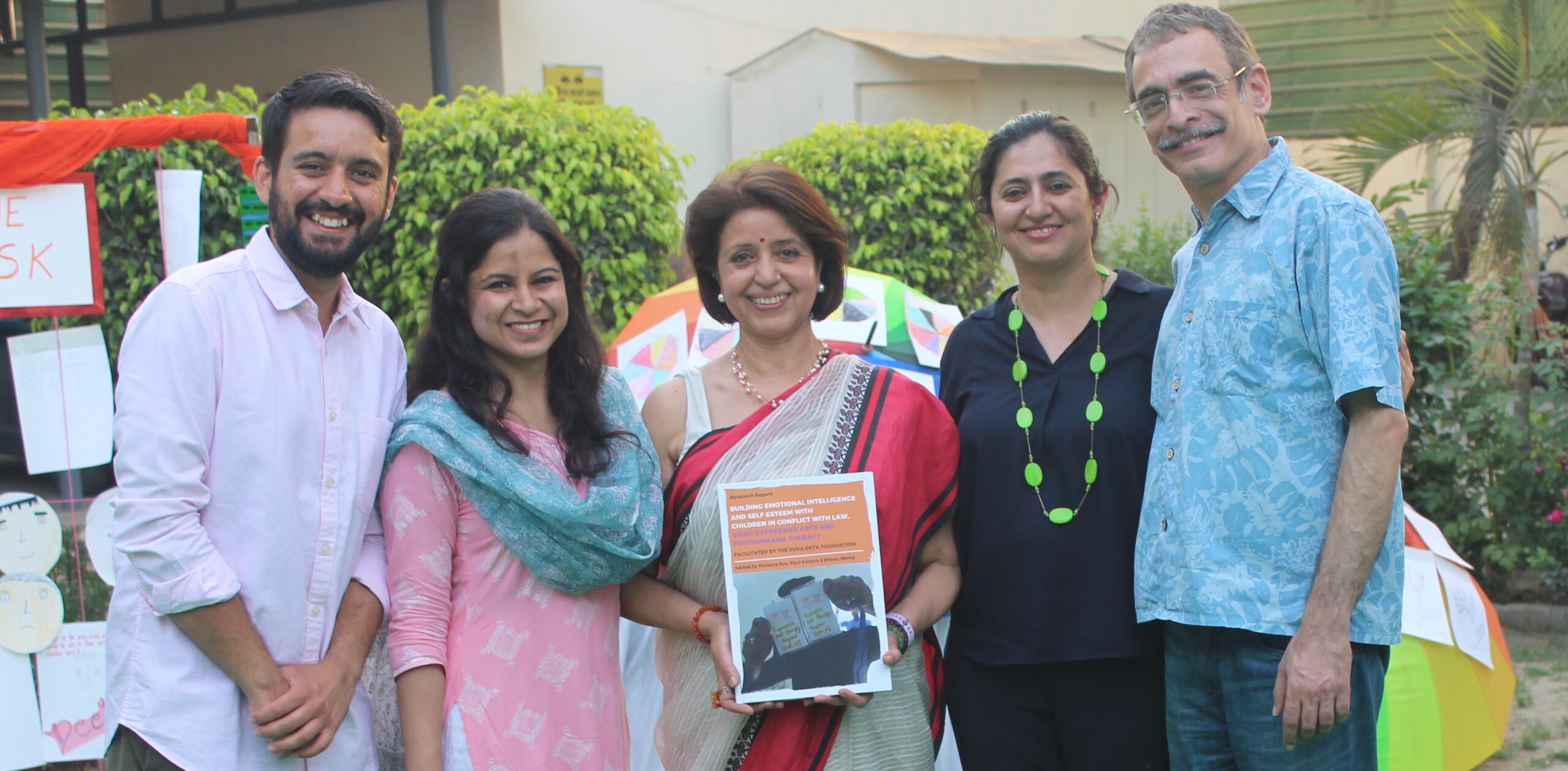Launch of Research Report - Building Emotional Intelligence and Self Esteem with CICL using Expressive Arts and Psychodrama Therapy
‘Threads of Humanity’ has been a flagship program of The Yuva Ekta Foundation. Started in 2009 by the core team, the program focuses on empowerment of at-risk youth and Children in Conflict with Law (CICL). Using the arts we create safe spaces, encouraging participants to undertake a journey of self-awareness and take ownership of their choices. It has been one of our longest and most successfully running programs through which, we have engaged with over 6000 young offenders and marginalized youth in the last 12 years. Our primary project objective is to use Expressive Arts and Psychodrama therapy towards creating a mentally and emotionally healthy child, who is equipped to break the cycle of crime and reclaim his place in mainstream society. Our Journey… Our team has been working with Children in Conflict with Law (CICL) for well over the last decade. Our initial interventions started in 2009 at the Adharshila Observation Home for boys, Sewa Kutir Complex, Kingaway Camp, New Delhi. We also conducted workshops in the ‘Kharja’ (waiting room), a temporary cell where boys from various observation homes waited for their bail plea to be heard. In 2011, we expanded the scope to include SPYM Sahyog De-addiction center. We soon realized that we needed to consolidate our findings about the efficacy of Theatre and Expressive Arts in building confidence amongst the boys, empowering them to express some of their deeper feelings, their anxieties and conflict, hence helping them negotiate better through their challenges when released. ‘Building Emotional Intelligence using Expressive Arts and Psychodrama Therapy with Children in Conflict with Law’ In May 2018, the Foundation launched a Research Project titled ‘Building Emotional Intelligence using Expressive Arts and Psychodrama Therapy with Children in Conflict with Law', a comprehensive, longitudinal study to measure the impact of creative arts therapies on young offenders. For this project we expanded our team to include two dedicated members -Ms. Vasvi Srivastava, a Psychologist and Co-Founder Abhyaantar Centre for the Arts, as our Co-Principal Investigator and Ms. Magdalene Jeyarathnam, our Lead Psychodramatist, who runs the Indian Institute of Psychodrama. The very first of its kind in India, this study required us to shift to the Place of Safety and Special Home for Boys (the Home), Majnu ka Tila, New Delhi (our project site), which houses young offenders aged 16-21 years. As part of the project, we facilitated over 50 Expressive Arts and 10 Psychodrama Therapy sessions with 40 participants at the Home. The assessment done by our Co-Principal Investigator on the Research Project has shown that boys who participated in the workshops have shown a quantitative increase in self-esteem. Several other changes, including reduced aggression, and a general sense of calm and happiness have also been reported. We finally launched our research report on 30th March 2020, at Place of Safety and Special Home for Boys, Majnu ka Tila. We were honored to have Justice Madan Lokur (Retired Judge, Supreme Court of India) and Mr. Anurag Kundu (Chairperson, Delhi Commission for the Protection of Child Rights) along with Ms. Puneeta Roy (Managing Trustee, The Yuva Ekta Foundation) to release our report. True to our style, the evening was an immersive experience where each of our guests participated in an Art activity with the boys from the Home, and found ways to connect, ideate and share their stories with each other. We also had a beautiful exhibition setup, where we showcased all the artwork that the participants had created as part of the Expressive arts workshops with us. Sharing some excerpts from the feedback of our participants- “I can control my anger now. If someone says something, I leave the place and sit aside, or share with friends. I also play sometimes, then I forget what I was angry about”. - Chetan (name changed) “My friend has learnt how to adjust, earlier he wanted to fight with everyone over TV remote control, he just wanted to keep it to himself. Now if someone asks for the remote, he shares it and comes to an agreement so that everyone gets a chance to operate. He has learnt to adjust”. -Lucky (name changed) “Earlier I never used to pay attention to my emotions, nor tried to understand what they were, their meaning and reasons behind them. In the workshop we were made to understand the meaning and importance of our emotion, we understood that there are layers of emotions behind our emotions as well. We learnt about our emotions and how it impacts us” - Dinesh (name changed) “Ma’am I will do good work, even if I earn few rupees less, but it should be respectable. Here I have learnt a lot of skills, I have learnt camera work as well, so I will pursue this when I get out. Will think about it when I get out, but will do good work”. - Chirag (name changed) The way forward… Based on our learnings, we intend to scale up even as we deepen our intervention. As we build capacity to work in more Observation Homes, we will also look at after release care that would include Counselling, Legal Aid, Vocational Training, Placement and Mentoring. Simultaneously we will be working on advocacy and sensitization through Young Adults from schools and Universities as well as Judges and Magistrates connected with the field of Juvenile Justice. We have submitted a copy of our report to the Ministry of Women & Child Development, to bring about Policy changes in the Restorative interventions within Observation Homes, even as we push for the introduction of Art Therapy in every Children’s Home within the country. We also hope to replicate this model in other Observation homes across the country, as we continue to work at re-integrating CICLs into mainstream society.
